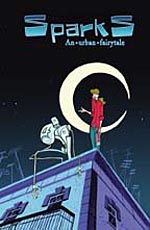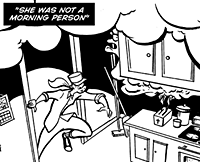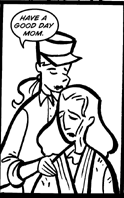
 Writer/Artist: Lawrence Marvit
Writer/Artist: Lawrence Marvit
Price: $35.95
Publisher: Slave Labor Graphics
ISBN: 0943151627
The appeal of many fairy tales, at least to the very young, lies in the way they deal with the theme of escape. At the very least, they create a heightened reality where the fantastic is able to invade the mundane world; in the most extreme cases, they create a world where even the most insignificant and unappreciated individual can achieve greatness.
When you're young, the appeal of CINDERELLA comes from watching a poor girl trapped in poverty and surrounded by cruel, unloving relatives become a beautiful young woman loved by a wealthy, handsome man.
Of course, when you get older, you tend to ask yourself questions that didn't seem important when you were younger - questions like, "Why did Cinderella remain with these awful people instead of leaving on her own?" Or, "Why did Cinderella's fairy godmother wait years and years to help her out?"
Most importantly, you tend to ask yourself, "Why did Cinderella even need the prince to be happy?"
Lawrence Marvit's SPARKS is a fairy tale for people who grew up asking these kinds of questions, a story that takes the essence of fairy tales and places them in the context of the real, modern world. Like many fairy tales, it deals with the fantastic invading the mundane, and an unappreciated individual's quest for greatness. Unlike most fairy tales, it knows the answers aren't as simple as waiting for the day a prince will come.
SPARKS concerns Jo, a 20-year-old woman living in a poor neighborhood in an unnamed city. She works in a garage and is good at her job, although the other people her age find it weird.
In another city, another place, Jo might be recognized as the smart, fun person she really is; in this neighborhood, though, she's seen as a flat-chested "mental case". The people who surround her are the kind of people who think they're more than they are; who see dead-end jobs and meaningless sex as a step on the road to "something better". They're beneath Jo, but they're the only people she's ever known, and she believes it when they tell her she's beneath them.
At home, Jo's policeman father abuses her with words and abuses her mother with his fists. The mother quietly accepts this situation by escaping into a pill-induced haze, convincing herself that within her drunken brute of a husband is the good man she thinks she married. Jo's convinced she needs to stay in her home to protect her mom, but it's more than that - she's afraid to take any kind of steps away from the world she knows.
 She has the vaguest of plans and dreams; maybe the handsome rich guy who frequents the garage will notice her. Maybe one day she'll finish the car she's fixing up and drive far, far away. Maybe...
She has the vaguest of plans and dreams; maybe the handsome rich guy who frequents the garage will notice her. Maybe one day she'll finish the car she's fixing up and drive far, far away. Maybe...
One night, it gets particularly bad for Jo. Retreating to the garage the next day, she indulges herself in a project, building a metal effigy of her version of the perfect man - a being with "shoulders to bear the weight of the world...strong arms to hold me tight...legs to carry me to a better place..."
Lo and behold, the metal man comes to life. Suddenly, Jo is confronted with a being that is a literal blank slate, which needs someone to teach him of the world. The metal man finds himself christened "Galahad", and with Jo's help he begins to learn about the world he lives in. The process also allows Jo to rediscover the best parts of herself, and finds the strength to face the world.
This summary only scratches the surface of SPARKS, which combines moments of romance, comedy, tragedy and wonder, often all on the same page. Galahad remains the only fantastic element of the story; the rest of SPARKS' world is often painfully real. SPARKS doesn't romanticize Jo's reality; her father is brutal in his cruelty toward her, and her attempts at social interaction often end in embarrassment and humiliation.
And yet, Marvit doesn't make these situations completely black and white; Jo's father is allowed a scene that explains how he became the man he is, and once in a while Jo meets a nice guy, just not someone she could be with. The scene where Jo meets the "prince" manages to play out in a way that's both predictable and unpredictable, showing the "prince" to be not exactly a jerk, but not the solution to Jo's problems, either.
Marvit's skill with characterization is deftly balanced by his skill with visuals; he comes from an animation background, and SPARKS has the cinematic feel of a great animated film.
Like Japanese manga, SPARKS uses an expanded number of pages to allow scenes to play out in "decompressed time," giving them a more relaxed, realistic pacing. Some pages will be packed with tiny panels; other, more action-oriented sequences will take place over dozens of large splash pages. Long monologues are often packed into one word balloon, while conversations take place in a series of back-and-forth headshots as each person speaks. As simple as Marvit's style may first appear, it's capable of great subtlety and power; Galahad may have no mouth and his eyes may be painted on, but Marvit is still able to allow him to communicate through body language.
 The beauty of SPARKS is the way it allows the reader to become absorbed into its world. When a tragedy occurs in the story, it doesn't feel foreshadowed or gratuitous; instead, it plays out the way a moment of violence would in real life - spontaneous, horrifying and painful. A scene involving Galahad's reaction to the tragedy could have played out like the worst kind of sentimental moment in a Steven Spielberg film, but it works because we've been allowed to understand why Galahad would react this way, and because the moment isn't lingered upon.
The beauty of SPARKS is the way it allows the reader to become absorbed into its world. When a tragedy occurs in the story, it doesn't feel foreshadowed or gratuitous; instead, it plays out the way a moment of violence would in real life - spontaneous, horrifying and painful. A scene involving Galahad's reaction to the tragedy could have played out like the worst kind of sentimental moment in a Steven Spielberg film, but it works because we've been allowed to understand why Galahad would react this way, and because the moment isn't lingered upon.
Many scenes in SPARKS could have easily spiraled out of control, but they work because Marvit respects his characters enough to let them evolve naturally. There are countless moments in SPARKS that ring true; there are very few that ring false. Even the action-packed climax works, because it ties into what Jo and Galahad have discovered about themselves, and what their lives will become.
SPARKS has an unusual history. Marvit had always intended it to be a graphic novel, but initially released it as a series of 50-page installments from Slave Labor. The book received excellent reviews and got an Eisner nomination, but didn't reach much of an audience, prompting Marvit to put the story on hold until he could finish it and release it all at once as he had originally planned.
Thankfully, Slave Labor was willing to support the story, and approved its release in a 400+ page volume containing over 160 new pages. While the length (and the $36 price tag) may seem intimidating to most readers, it's worth the money; Marvit's style ensures the pages fly by, and the story wouldn't read the same in a more compressed format.
SPARKS does what the best fairy tales do; it creates a world where even the most insignificant, unloved person can find greatness. It's not a world of magic pumpkins or fairy godmothers; it's a world where people drink too much and curse too much, and settle for less because they don't believe there's anything more; where people have bad sex and mistake it for love.
It's about being alone in a crowded room, about struggling to believe you're right when the rest of the world says you're wrong. It's about realizing you're the one who has to save yourself, and love is not simply about being the fairest at the ball. Most importantly, it's about being alive. Lawrence Marvit's SPARKS is one of the best graphic novels of 2002.

This article is Ideological Freeware. The author grants permission for its reproduction and redistribution by private individuals on condition that the author and source of the article are clearly shown, no charge is made, and the whole article is reproduced intact, including this notice.


